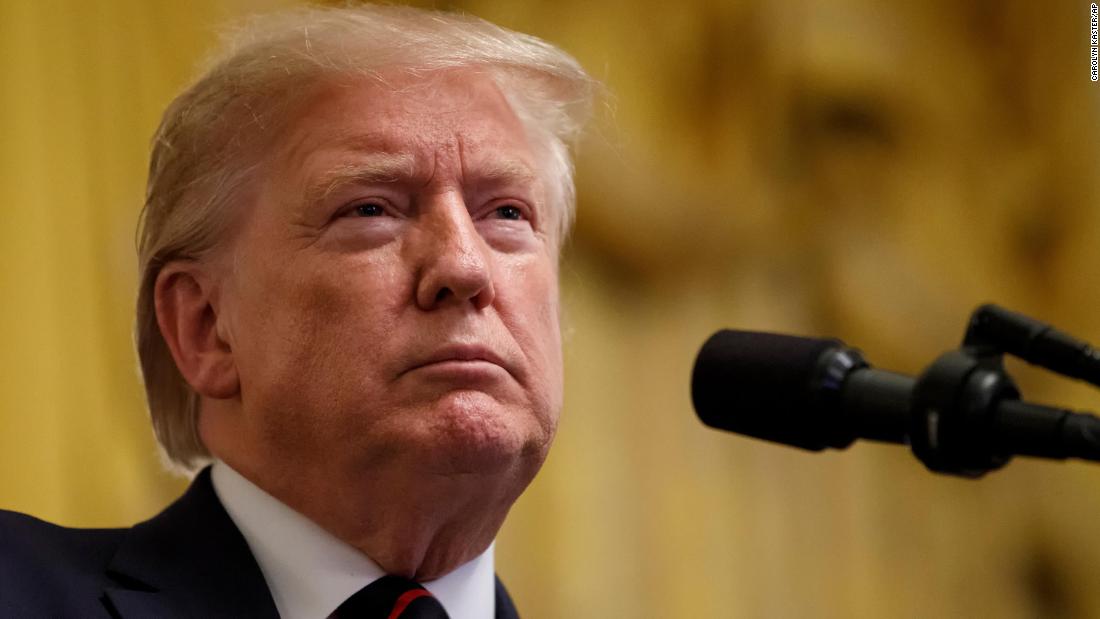[ad_1]
In a rare statement released Monday, the inspector general addressed a false claim pushed by Trump and some of his allies on Capitol Hill, including House GOP leader Kevin McCarthy of California and Sen. Lindsey Graham of South Carolina, that the whistleblower lacked firsthand knowledge of the conduct outlined in the complaint and therefore the allegations were based on “hearsay.” But the statement from the inspector general made clear that the whistleblower was not simply communicating secondhand knowledge.
“The whistleblower stated on the form that he or she possessed both first-hand and other information,” the statement read. “The ICIG reviewed the information provided as well as other information gathered and determined that the complaint was both urgent and that it appeared credible. “
The statement clearly says the whistleblower had “direct knowledge of certain alleged conduct” and that Intelligence Community Inspector General Michael Atkinson obtained additional information during his preliminary review that supported other allegations in the complaint not based on firsthand knowledge, including Trump’s July 25 phone call with Ukrainian President Volodymyr Zelensky.
“As part of his determination that the urgent concern appeared credible, the Inspector General of the Intelligence Community determined that the Complainant had official and authorized access to the information and sources referenced in the Complainant’s Letter and Classified Appendix, including direct knowledge of certain alleged conduct, and that the Complainant has subject matter expertise related to much of the material information provided,” the statement says.
“Although the Complainant’s Letter acknowledged that the Complainant was not a direct witness to the President’s July 25, 2019, telephone call with the Ukrainian President, the Inspector General of the Intelligence Community determined that other information obtained during the ICIG’s preliminary review supported the Complainant’s allegations,” it adds.
Earlier Monday, Trump tweeted: “WHO CHANGED THE LONG STANDING WHISTLEBLOWER RULES JUST BEFORE SUBMITTAL OF THE FAKE WHISTLEBLOWER REPORT? DRAIN THE SWAMP,” referring to a theory that seems to have been initially propagated by the right-wing website The Federalist on Friday.
The article claims that “between May 2018 and August 2019, the intelligence community secretly eliminated a requirement that whistleblowers provide direct, first-hand knowledge of alleged wrongdoings.”
The statement said that the form submitted by the whistleblower on August 12, 2019, was the same one the inspector general has had in place since May 24, 2018. The statement reiterated that having firsthand knowledge of the event has never been required in order to submit a whistleblower complaint.
“Although the form requests information about whether the Complainant possesses first-hand knowledge about the matter about which he or she is lodging the complaint, there is no such requirement set forth in the statute,” the statement reads.
“In fact,” the inspector general’s statement continues, “by law the Complainant … need not possess first-hand information in order to file a complaint or information with respect to an urgent concern. The ICIG cannot add conditions to the filing of an urgent concern that do not exist in law.”
The statement does state that three new forms have been made available on the inspector general’s website as a part of a months-long process. Those forms were developed because the previous versions, including the one used by the whistleblower, “could be read — incorrectly — as suggesting that whistleblowers must possess first-hand information to file an urgent concern complaint with the congressional intelligence committees.”
Pro-Trump pundits and lawmakers spread the theory on Twitter and TV over the weekend as evidence of some nefarious plot against the President. Rep. Jim Jordan, an Ohio Republican told Jake Tapper on CNN’s “State of the Union” that whistleblowers no longer need firsthand knowledge because “they changed the form.”
Tapper pushed back, fact-checking Jordan. “Experts say it has never been true that you need to have firsthand knowledge to be a whistleblower,” Tapper said.
The theory put forth by the President and his allies hinges on the idea that the inspector general recently changed the rules to allow individuals with secondhand knowledge of an event to submit a whistleblower complaint. This is wrong.
A previous version — cited by The Federalist — of the form that whistleblowers submit to alert the inspector general of the intelligence community of an “urgent concern” states that in order for the inspector general to determine that the concern is credible “the IC IG must be in possession of reliable, first-hand information.”
This does not mean that the inspector general would reject a complaint if it presented only secondhand knowledge, but that firsthand information would be needed for the complaint to be found credible and passed further up the chain of command. The inspector general has 14 days from the time the complaint is submitted to investigate and make a determination as to whether the urgent concern is credible.
And that’s exactly what happened in the case of this whistleblower.
During the investigation into this specific complaint about Trump’s July 25 call with the Ukrainian President, the inspector general found additional information that “supports the Complainant’s allegation that, among other things, during the call the President ‘sought to pressure the Ukrainian leader to take actions to help the President’s 2020 reelection bid,’ ” according to the letter from the inspector general to Joseph Maguire, the acting director of national intelligence.
CNN’s Holmes Lybrand contributed to this report.
[ad_2]
Source link


